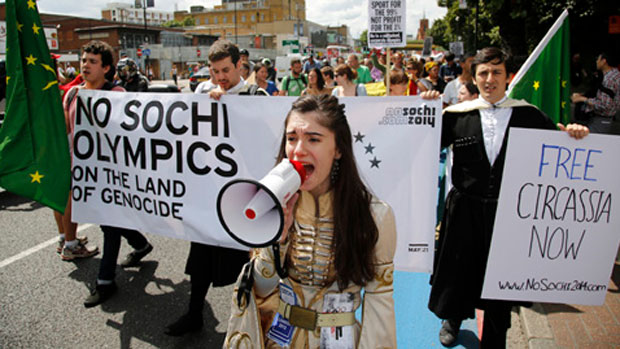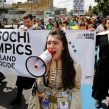
Circassians Urge Russian President and Parliament to Recognize Circassian ‘Genocide’
Publication: Eurasia Daily Monitor Volume: 10 Issue: 85
By:

On May 2, three major Circassian organizations addressed an appeal to President Vladimir Putin and the Russian parliament. In it, they urged the Russian government to recognize the Circassian “genocide” and provide favorable conditions for the return of the descendants of the Circassian exiles in Syria to their historical homeland in the North Caucasus. “Under the current circumstances, ignoring the obvious historical fact of the genocide of Circassians by the Russian Empire in 19th century has created space for the excessive politicization and outwardly entirely legitimate resolutions by a foreign state, recognizing the Circassian genocide,” the statement read. Its authors boldly endorsed the Georgian parliament’s resolution on the Circassian “genocide” that was passed in May 2011. At the same time, the statement tactfully declared that the Olympics in Sochi in 2014 should not be politicized (https://aheku.org/page-id-3542.html).
Overall, the statement was well crafted and leaves an impression that its signatories tried to use wording that would not antagonize the Kremlin while at the same time advancing the Circassians’ interests, using international attention to the region in the run-up to the Sochi Olympics. The appeal was signed by three persons—Adam Bogus, the head of the Adygean organization Adyge Khase; Mukhamed Cherkesov, the head of Adyge Khase in Karachaevo-Cherkessia; and Asker Sokht, the head of the Adyge Khase organization in Krasnodar region. The latter two Circassians have been known as ostensibly pro-Moscow figures in the Circassian leadership, and yet they signed a fairly bold statement. “In our view, endlessly ignoring these issues is counterproductive,” the appeal concluded. “We hope that our address will be received with due attention, while the problems we have raised will find an effective resolution” (https://aheku.org/page-id-3542.html). Unless the appeal was unofficially invited by the Kremlin to show some limited recognition of Circassian issues, this document suggests that the Circassians’ awareness of their problems and their desire to resolve them have grown significantly over the past several years.
While some observers might find the Circassians’ demands excessive or unrealistic, the letter also lists quite basic expectations that would be accepted immediately in many other countries, except perhaps for regimes like Russia. For example, the Circassian activists asked that greater interaction between the North Caucasian Circassians and the large Circassian diaspora abroad be permitted. According to some estimates, about 90 percent of ethnic Circassians live outside the Russian Federation, primarily in Turkey, but also in other countries including Syria, Jordan, Israel, Germany and the United States. Travel to the North Caucasus is so difficult due to stringent rules for getting Russian visas, and so expensive due to intentionally blocked travel routes, that many ethnic Circassians residing outside Russia cannot visit their homeland despite the fall of the Iron Curtain more than 20 years ago. The Circassians also asked the Russian government to include a Circassian cultural element in the Olympics’ program. The Russian government thus far has been intent on presenting the Cossacks as the “native residents” of Sochi region, even though it is a historical fact that Cossacks along with the regular Russian army drove the Circassians out of this area during the Russian conquest of the region in the 19th century.
In fact, the Russian government has gone to great lengths to erase all traces of the Circassians in the Krasnodar and Stavropol regions and “mark” them with Russian symbols that are often offensive to the Circassians and other North Caucasians. “Russia’s Krasnodar and Stavropol regions have turned into exhibitions of achievements of militarist monumental propaganda,” a Circassian analyst pointed out. New statues of Alexei Yermolov, the Russian general known for his brutality during the 19th century Russian-Caucasian war, were erected in Pyatigorsk and Mineralnye Vody in Stavropol region. A new statue of a Russian general from the same epoch, Grigory Zass, was erected in Armavir in Krasnodar region. In Sochi, the authorities put up a monument depicting Ivan Lazarev. Both generals Lazarev and Zass were known for extreme cruelty in waging wars against the Circassians in the northwestern part of the Caucasus (https://aheku.org/page-id-3006.html). As Russians celebrate these controversial figures, Circassian rhetoric also escalates, which produces cleavages in an area already riven with ethnic tensions and conflict.
Instead of finding some common ground with the Circassians, Russian think tanks close to the government and the security services, such as the Russian Institute for Strategic Studies, have lamented the “impunity of Circassian activists” and called on the government to crack down on them and “amend” textbooks in order to excise accounts of the painful past that are unfavorable to the Russian government (https://www.regnum.ru/news/polit/1532239.html#ixzz1vFGpQI5R).
Moscow’s unwillingness to make any meaningful steps to accommodate Circassian grievance, appear to be antagonizing even traditional Kremlin loyalists among the Circassians. With the 2014 Olympic Games in Sochi quickly approaching, Circassian activists are bound to ramp up their actions to draw the world’s attention to their issues. Even though Moscow has so far remained largely unperturbed by Circassian activism, the world’s attention to the region certainly presents the Circassians in the North Caucasus and worldwide with a unique opportunity to advance their interests.




